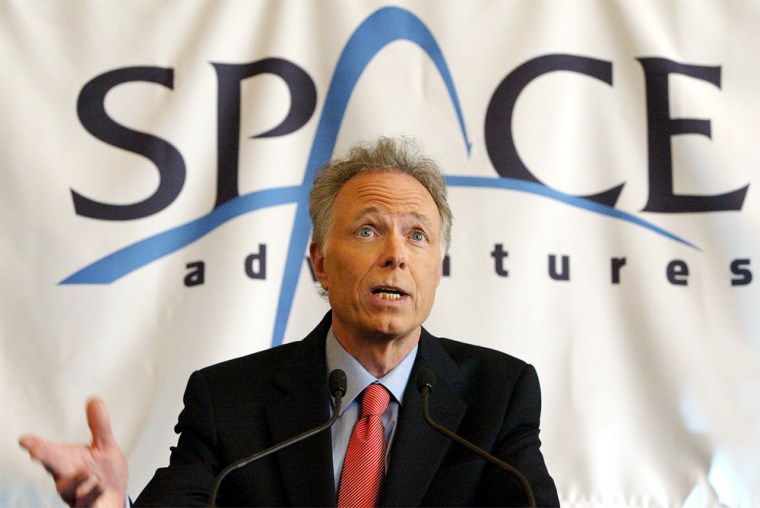Russian physicians have blocked New Jersey millionaire Greg Olsen's multimillion-dollar ride to the international space station due to health concerns, the organizers of his trip acknowledged Wednesday. But they hoped he'd still be able to fly in space.
Olsen, 58, who made his fortune in optics, has been spending nearly the last three months at Russia's Star City cosmonaut complex, training for a flight on a Russian Soyuz craft in October or next April. However, most of Olsen's time has been taken up in classroom work and language instruction rather than physical training.
This month, Russia and the other space station partners were to decide whether Olsen would be on the next Soyuz crew. Russia's Interfax news service said the cosmonaut training center cited medical concerns as the reason for turning down Olsen's space bid.
The Russian online publication Gazeta.ru reported that the medical decision was rendered Tuesday night, and related to Olsen's inability to cope with the G-forces associated with spaceflight. "In the course of physical training, physicians established Olsen's unfitness for the space overloads," Gazeta.ru reported.
RIA Novosti, another Russian news agency, also reported that Olsen was turned down Tuesday night.
Olsen's intended space trip was announced in late March by Virginia-based Space Adventures, which helped arrange space station visits by millionaires Dennis Tito and Mark Shuttleworth in 2001 and 2002, respectively. Olsen is the founder and chief executive officer of New Jersey-based Sensors Unlimited, and he had hoped to use his company's infrared imaging system for research aboard the space station.
Organizers acknowledge 'potential condition'
After the Russian reports emerged, Space Adventures released a statement saying Olsen's medical evaluators were concerned that he "may have a medical condition that could potentially prevent him from participating as a cosmonaut in the Russian space program."
"At this point in time, there is no certainty that this potential condition will preclude Dr. Olsen from an orbital mission to the international space station," the statement read. "A number of other cosmonauts have failed these tests, referred to as GMK, and have eventually traveled to space. Dr. Olsen is thoroughly enjoying his training in Star City and is very optimistic that his dream of space travel will become a reality."
GMK is the Russian acronym for "Main Medical Commission," the panel that clears would-be cosmonauts for training and flight.
Space Adventures declined to make further comment. The company's chief executive officer, Eric Anderson, is in Moscow with Tito for previously scheduled discussions on a range of space-related topics, including the prospects for suborbital space tourism.
$20 million ticket
The published list price for passenger fares to the orbiting space station is $20 million, a figure that Tito cited again this week during an interview with MSNBC.com at the SpaceShipOne launch in Mojave, Calif. However, observers say the Russians actually charged less than the stated figure.
When Olsen's plans were announced, there was no indication of medical concerns, and a spokesman for the Russian Space Agency remarked on how healthy Olsen looked for a 58-year-old. In comparison, Tito was 60 years old when he flew; Shuttleworth was 28.
Gazeta.ru said the agency declined detailed comment on Wednesday. It quoted an agency spokesman, Vyacheslav Mikhailichenko, as saying: "The federal [space] agency doesn't answer for Olsen's preparations. A contract with him for the flight was not concluded."
Preparations for a Russian spaceflight generally involve a series of contracts over time, first with the Star City training center, then with the space agency. Payments also are spread out over a period of months. For example, hundreds of thousands of dollars were paid for pop star Lance Bass' cosmonaut training in 2002, even though the larger deal to send him into space fell through.
Olsen would have flown to the station for a weeklong trip in the company of two professional astronauts. Under the current arrangement, a Soyuz capsule is sent to the outpost every six months, bringing up a fresh two-person crew for a six-month stay, as well as a short-term visitor. That visitor flies back down to Earth with the returning space station crew, aboard the Soyuz capsule that had been attached to the station for the previous six months.
Since last year's Columbia tragedy, the Soyuz crew capsules have provided the only means of transportation to and from the 16-nation space station.
